Millennials are at the forefront of the recent rise in public support for same-sex marriage and the legalization of marijuana. Millennials take more liberal positions than older generations on other major issues as well, including immigration reform. And they are far more likely than older age cohorts to express support for an activist government.
But on some issues, Millennials’ views differ little from those of older Americans. About half (48%) say it is more important to protect gun rights than control gun ownership, about the same as older generations. A majority of Millennials say that abortion should be legal in all or most cases, but so do comparable percentages of Gen Xers and Boomers, while the Silent generation is less supportive of legal abortion.
Same-Sex Marriage
Support for same-sex marriage has increased dramatically over the past decade. But as was the case in 2004, there are substantial differences in opinions across generations. Millennials were the most supportive of same-sex marriage a decade ago and have grown more so since then. Currently, 68% favor allowing gays and lesbians to marry legally, up from 44% in 2004. During the same period, the proportion of Gen Xers who support gay marriage increased from 40% to 55% while rising by 18 percentage points among Boomers (30% to 48%) and by 20 points among members of the Silent generation (18% to 38%).
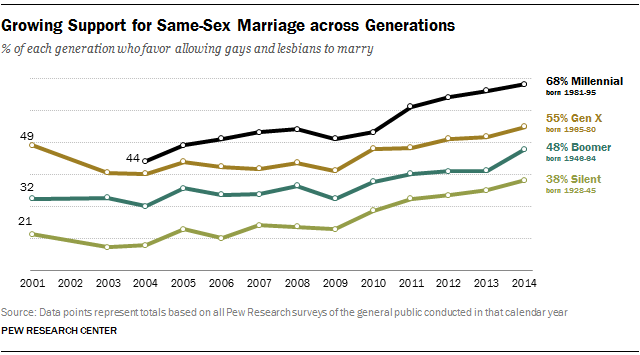
Legalization of Marijuana
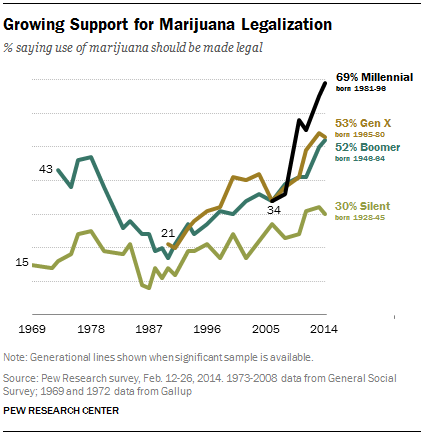
Millennials’ support for legalizing the use of marijuana has surged in recent years. Just eight years ago, 34% favored the legal use of marijuana. Today, that figure has roughly doubled to 69%.
Support for legalizing marijuana has risen over the same period among Gen Xers and Boomers, though less dramatically. Currently, 53% of Gen Xers and 52% of Boomers say marijuana should be legal, up 19 points and 18 points, respectively, since 2006. Silents have shown far less change. Just 30% say marijuana use should be legal, three points higher than eight years ago.
Boomers’ support for marijuana legalization peaked in the late 1970s, before plummeting in the 1980s. But today, Boomers’ support for legalizing marijuana is greater than it was four decades ago.
Views of Immigration Policy
The public has long supported a “path to legalization” for undocumented immigrants in the U.S., though there is less support for allowing them to apply for citizenship.
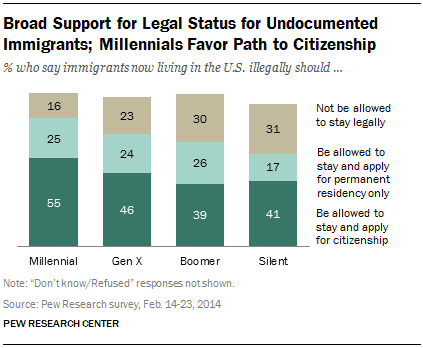
Majorities across age cohorts say there should be a way for illegal immigrants already in the United States to stay in the country legally if they meet certain requirements.
But only among Millennials does a majority say those in the country illegally should be allowed to apply for citizenship; 55% among the youngest cohort favor a path to citizenship, compared with 46% of Gen Xers, 39% of Boomers and 41% of Silents.
Abortion and Gun Control
Generational patterns are less clear on two other major social issues—abortion and gun control.
In recent years, half or more Millennials, Gen Xers and Boomers have supported legalizing abortion in all or most cases while Silents have been less supportive. Currently, 59% of Gen Xers, 56% of Millennials and 52% of Boomers believe abortion should be legal in all or most cases. In contrast, just 42% of Silents say abortion should be legal under most circumstances.
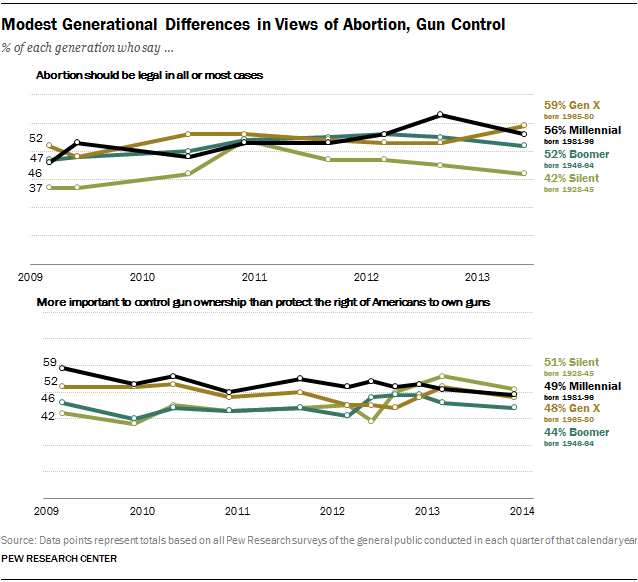
There also are modest generational differences in opinions on gun control. Millennials, like older cohorts, are divided over whether it is more important to protect the right of Americans to own guns or more important to control gun ownership. About half of Silents (51%), Millennials (49%) and Gen Xers (48%) and slightly fewer Boomers (44%) say that controlling gun ownership is more important than controlling gun rights.
Generational Differences over Government’s Role
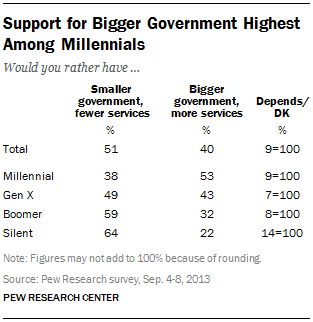
Millennials have long been more supportive than older generations of an activist government. In a September 2013 survey, about half (53%) of Millennials favored a bigger government providing more services—the highest of any generation. Just 38% said they would rather have smaller government providing fewer services.
Majorities of Silents (64%) and Boomers (59%) say they would rather have a smaller government providing fewer services. Gen Xers are divided, with 49% preferring smaller government and 43% bigger government.
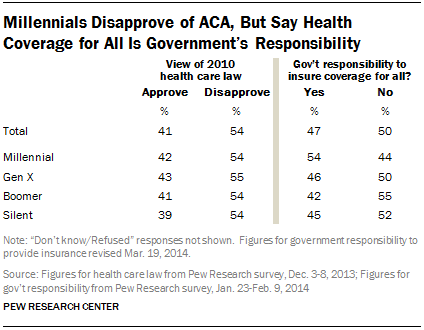
Notably, Millennials are as skeptical as older generations of the 2010 health care law. In December 2013—the most recent Pew Research Center survey on the Affordable Care Act—there were no significant differences across generations in views of the law. About four-in-ten in each cohort approved of the law.
Yet by 54% to 42%, Millennials think it is the federal government’s responsibility to make sure all Americans have health care coverage. There is less support among older age cohorts for the government insuring health coverage for all.
Higher Priority for Government: Programs for the Young or Old?
Millennials differ from older generations over the role of government, and they also are more likely to give priority to government programs that benefit younger people.
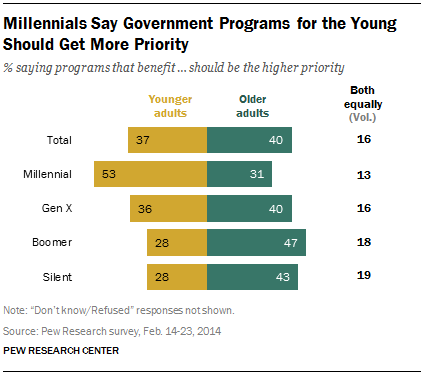
Millennials are the only age cohort in which more say that government programs benefitting younger people should be a higher priority than programs benefitting older people (53% vs. 31%). There is especially strong support for programs to aid the young among the youngest Millennials (ages 18 to 25): 60% say programs that benefit younger people should be a higher priority for government, compared with 45% of older Millennials.
Gen Xers are divided over whether programs for younger people (36%) or older people (40%) should receive more priority. Boomers and Silents, by wide margins, say that programs that benefit older people should be the higher priority.
Views of Social Security
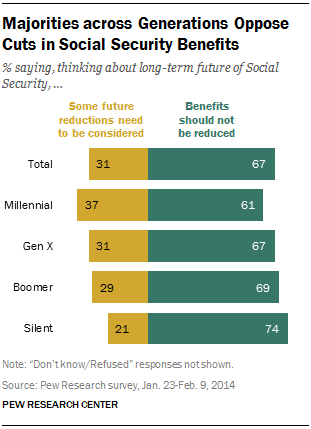
Majorities across generations say that in thinking about Social Security’s future, benefits should not be reduced in any way. Even among Millennials—those furthest from retirement—more say Social Security benefits should not be reduced by a 61%-37% margin.
At the same time, there is considerable doubt—especially among Millennials and Gen Xers—that Social Security benefits will still exist, much less be funded at current levels, by the time they retire.
Boomers say they expect Social Security will be able to provide some—albeit reduced—benefits. Roughly seven-in-ten Boomers expect to receive benefits at reduced levels (42%) or current levels (26%).
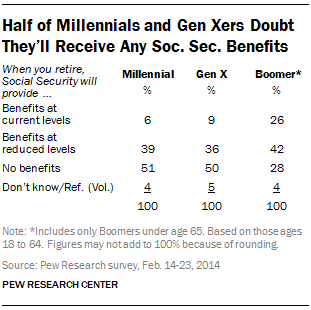
Millennials and Gen Xers are much more pessimistic. About half of each group (51% of Millennials and 50% of Gen Xers) say that when they retire Social Security will not have enough money to pay any benefits.
Age, Race and Views of Issues
As with many attitudes about politics, there are wide racial differences across generations over the role of government, with non-whites much more supportive than whites of activist government. But in opinions about some social issues—notably same-sex marriage and immigration—the differences are much narrower.
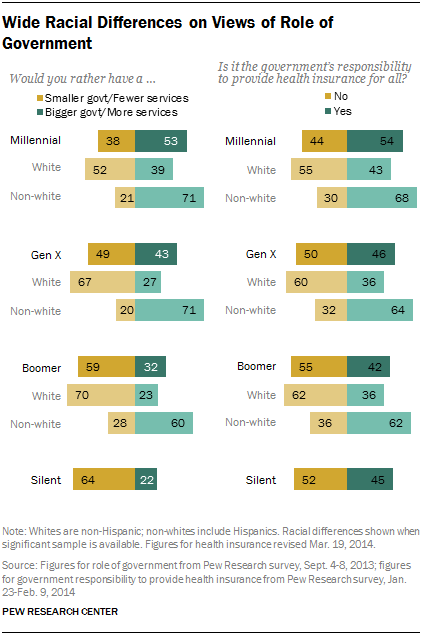
Overall, 53% of Millennials favor a bigger government providing more services. But white Millennials prefer smaller government by 52% to 39%. Non-whites would rather have a bigger government by an even larger margin (71% to 21%).
Similarly, most white Millennials (54%) say it is not the federal government’s responsibility to provide health insurance for all; 68% of non-white Millennials say this is the government’s responsibility.
A similar pattern of racial and ethnic differences is also evident among Gen Xers and Boomers in views about the size of government and whether it has an obligation to provide health insurance for all. (There are not enough non-white Silents in the surveys to analyze.)
On other issues—such as same-sex marriage and immigration—there are only slight differences in opinions across racial and ethnic groups within generations. For example, white and non-white Millennials offer nearly identical views of same-sex marriage; 70% of whites and 67% of non-whites favor it, and differences are also insignificant among the older cohorts.
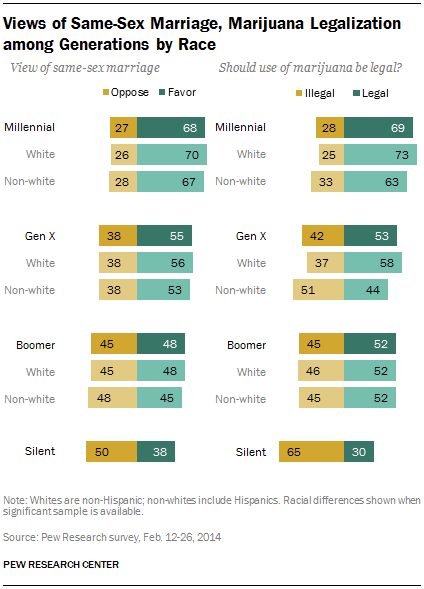
White Millennials are also about as likely as non-white Millennials, and more likely than older whites, to say illegal immigrants who meet certain requirements should be allowed to apply for citizenship. About half of white Millennials (53%) and 58% of non-white Millennials favor a path to citizenship. Among the older cohorts, 42% of white Gen Xers and 38% of white Boomers share this view. Among the Silent generation, 41% favor a path to citizenship.
When it comes to the legalization of marijuana, white Millennials are more supportive than non-white Millennials, but majorities in both groups say the use of marijuana should be legal (73% and 63%, respectively). Among Gen Xers: 58% of whites favor legalization of marijuana, compared with 44% of non-whites.




